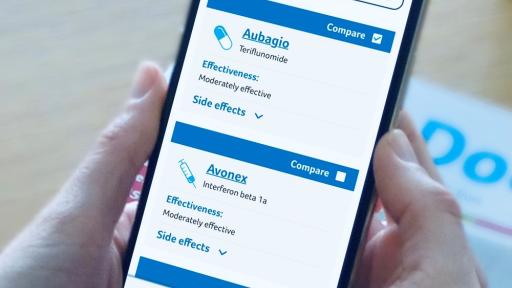Nuedexta (dextromethorphan/quinidine) is a drug used to treat pseudobulbar affect – uncontrolled laughing or crying – a potential symptom of multiple sclerosis. Nuedexta was licensed by the European Medicines Agency (EMA) in June 2013, however following a public statement from the EMA in February 2016 the drug has been withdrawn from use in the European Union. This is due to commercial reasons rather than any safety concerns.
Although the way Nuedexta works is not understood, it is thought that it affects the way signals are transmitted between brain cells. These signals are transmitted by chemicals called neurotransmitters which are involved in the control of emotions. Nuedexta helps to normalise the activity of these neurotransmitters in the brain, reducing the symptoms of pseudobulbar affect.
Nuedexta is taken orally as capsules.
Nuedexta can interact with other medications and alter the effects of these drugs. Before starting treatment it is important to discuss the full range of medications that are being taken for multiple sclerosis and other conditions – whether prescription, over the counter or complementary approaches such as supplements. Any new medications should not be started without talking with a healthcare professional.
Nuedexta can cause changes in heart rhythm. People with a personal or family history of heart problems should discuss this with their doctor before starting treatment.
Other potential side effects include:
- diarrhoea
- dizziness
- headache
- sleepiness
- cough
- vomiting
- weakness
- swelling of feet and ankles
- urinary tract infection
- flu-like symptoms
- changes to liver function
- flatulence
Nuedexta should not be taken by women who are pregnant or breastfeeding.
A phase III study compared Nuedexta and placebo in people with pseudobulbar affect, 129 of whom had MS and 197 with motor neurone disease (also called amyotrophic lateral sclerosis or ALS). This found that the number of episodes in people receiving treatment was nearly half that of the placebo group across the 12 weeks of the study.
A 52-week trial which assessed the safety of Nuedexta in people with pseudobulbar affect found that the drug was generally well tolerated. 553 people with a range of neurological conditions took part in the trial, 223 of whom had MS. The most frequently reported side effects were nausea, dizziness, headache, drowsiness, fatigue, diarrhoea and dry mouth.


